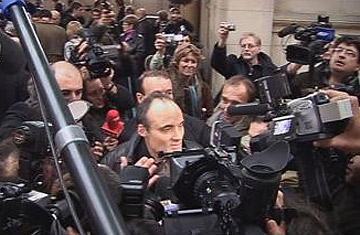
It's Hard Being Loved By Jerks (C'est dur d'etre aime par des cons)
(2 of 2)
IT'S HARD BEING LOVED BY JERKS
That's the caption for a cartoon of an exasperated Mohammed that ran on the cover of Charlie Hebdo, the French satirical weekly. It was the winner of a contest the magazine held in support of the Danish magazine that was threatened by Islamic fundamentalists after publishing an illustration of the Prophet with a bomb in his turban. Inside that issue of Charlie Hebdo were 12 other cartoons, including one in which four terrorist whose bodies are still smoking from a bomb blast are arriving in heaven, and Mohammed says "Wait, we've run out of virgins."
Muslims in France were no more amused than the ones in Denmark. (They consider any depiction of Mohammed to be blasphemy.) So three Islamic groups brought suit against Charlie Hebdo. Leconte's film follows the trial through recollections of witnesses and the legal teams as well as documenting the religious and political debates in the halls outside the courtroom. He focuses on the chronological suspense of the trial, and has the benefit of defense attorneys whose brilliance is as sharp as the magazine's. When the plaintiffs' lawyer argues that Islam is caricatured more unfairly than other religions, one attorney itemizes a long list of affronts toward Catholicism, including a description of the Pope as ... well, it sounds like "Shiite."
It's a serious issue, gods know, but Leconte keeps the film racing along like a Preston Sturges comedy. Aside from being a tribute to the liberality of the French judicial system (at least on free-speech matters), It's Hard Being Loved by Jerks is the briskest, most hilarious and, in its subversive way, most inspiring film so far at Cannes. — M.C.
24 CITY
Chinese director Jia Zhangke has long been a favorite at the Venice Film Festival — his Still Life won the Golden Lion there in 2006 — but this quasi-documentary is his first entry in the Cannes competition. Jia's stately, static camera style is well suited to the story, which weaves the comments of workers from a Chengdu factory with three fictional monologues, delivered by distinguished actresses of three periods of Chinese cinema: Joan Chen, Lu Liping and Zhao Tao. "As far as I'm concerned," Jia says in a program note, "history is always a blend of facts and imagination."
In the 60s, Factory 420 made airplane engines for the North in the Vietnam War. To raise consciences, and collective guilt, the factory brandished a photo of a young pilot who had been killed in a crash of a plane assembled there. The film interweaves the political overview — of a city institution being torn down to be replaced by commercial and residential buildings — with personal anecdotes that are poignant and charming. One woman recalls being at her parent's home with seven siblings, saying, "It was like an elephant living in the stomach of a sparrow."
As hard as their work was, it gave these people's lives rhythm and meaning, from their ten years into middle age. As one says, "If you have something to do, you age more slowly." 24 City is eloquent testimony to a China that is vanishing with each swing of the wrecking ball. But the memories of the workers in their factory microcosm, and telling documentaries like these, keep the past alive, so that later generations will know what once was, and what's been lost. — M.C.
